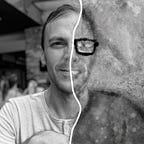Make cool shit and die
Information complexity and the meaning of life
The fate of the universe rests in your hands, hero. We see it all the time — cosmic battles of good and evil being played out on screen or in video games. But this is science fiction — surely, without superpowers, that hero could never be you… or could it?
The truth is, reality is not so different from the silver screen. There really are two competing cosmic forces in the universe — but they are not good and evil, and you can be the hero.
The prevailing force in the universe is decay — otherwise known as the Second Law of Thermodynamics. Leave an apple out and it will rot away, eventually disappearing entirely. The same is true of metal, plastic, or anything else — though it may take longer. Even our sun will eventually exhaust its fuel and decay after spreading its energy evenly throughout the universe. And this, this is the ultimate fate of the universe — a cold, empty uniform soup of useless energy.
You can’t uncrack an egg. Of course, you can make an egg, but that takes a lot more energy than it does to crack one — and at least one chicken. The point is, making a disorderly mess happens with ease — you can even extract energy from the process. But, it can’t be undone without putting more energy in than you took out. There is always wasted energy that leaks out into the cosmos.
The universe began in an orderly state with lots of useful energy. Imagine it like a drop of red ink in a glass of water. As time passes, the glass goes from a nice bright dot of red color to a pale faint sea of uniform pink. Nothing new will ever happen after the color dilutes. To be fair, the beginning is also kind of boring — just a drop of red and nothing much else to describe.
Yet, as we watch the color disperse, something magical happens. The drop turns into beautiful ribbons of complexity. If you repeat the experiment again, you will see different structures emerge — no two patterns are ever alike. But they are always there. Those ribbons of deep red color are you. In our universe, we are in the middle stage, where ribbons of complexity streak across the cosmos.
But unlike the ribbons of ink, the patterns of matter in the larger cosmos include a very special variety — replicators. As you can see in the glass of water, the ribbons appear and dissipate in one continuous act. Complexity is fleeting. It grows to a maximum and then immediately shrinks, never to return. Yet, in a small corner of the universe, on a tiny blue rock, complexity thrives — it replicates.
How and why this happened we may never know, but it did — and it is the only antidote to decay. That it actually happened is blindingly obvious. That which we see is that which has survived. Why don’t we see things that didn’t make copies of themselves? Easy — because they succumbed to decay before making copies of themselves. Some of these things are called life. One of these things is you.
What, exactly, is being copied by replicators? You might naively think it is matter — the stuff of which it is made defines the copy. True, a physical copy of something contains an equal amount of the same stuff, but that is not enough. A random mass of organic molecules is likely to be formless mush, not a living thing. What is copied is information. It is information that defines the configuration of matter embodied in things.
Yet, there is so much information contained in you that will never exist beyond the decay of your physical body. Your ideas, dreams, and imagination grow like complex ribbons across the synapses of your brain. But, they are as fleeting as a drop of ink in water — that is, unless you crystallize them by encoding the information contained within them in solid matter.
The goal of life is apparently to live, to survive. But, it’s not the physical stuff you are currently made of that needs to survive — that changes all the time — it is the information contained within you. The meaning of life is to perpetuate information. For far into the future universe, there are two possibilities to be found: the decayed remains of fleeting complexity, long forgotten and impossible to recover, or part of you — in a manner of speaking — evidencing at least a fight against decay.
So, what will you do, hero? Will you sit there consuming useful energy and turning it into wasted heat — an engine for the destruction of the universe — or, will you manifest complexity, crystallizing the information contained in every fleeting spark of imagination?
